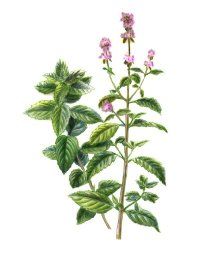Although there are more than 30 species of mint, peppermint is one of the most popular, with its purple-laced stems and bright green leaves.
According to Greek mythology, a furious Persephone turned the nymph Mentha into mint. Although myth claims it was born out of anger, peppermint actually has calming effects. This popular candy flavor can be used as an herbal remedy for stomach upset and other indigestion issues.
Advertisement
Uses for Peppermint
Peppermint is widely used as a food, flavoring, and disinfectant. As a medicine, peppermint is most well known for its effects on the stomach and intestines. Perhaps you've tried the various "tummy teas" available for stomach upset. Peppermint is a tasty way to relieve gas, nausea, and stomach pain due to an irritable bowel, intestinal cramps, or indigestion.
Peppermint is a carminative -- an agent that dispels gas and bloating in the digestive system -- and an antispasmodic capable of relieving stomach and intestinal cramps. Peppermint can be used for too much stomach acid (hyperacidity) and gastroenteritis (nausea and stomach upset that we sometimes call stomach flu), and it is safe for infants with colic.
When treating a baby with tummy cramps, you can give a teaspoon of peppermint tea if the baby will take it, or put a cloth soaked in warm peppermint tea on the infant's belly.
Peppermint also is used topically for the cooling and relaxing effect it has on the skin. Various muscle rubs and "ices" contain peppermint oil to reduce pain, burning, and inflammation. Like other volatile oils, peppermint oil is absorbed fairly well and can have a temporary pain-relieving effect on muscles and organs that are cramped and in spasm. As with all essential oils, dilute this oil before putting it directly on your skin.
Peppermint also allays itching temporarily. Rub a drop of diluted peppermint oil onto insect bites, eczema, and other itching lesions, including the rash of poison ivy. Peppermint can help relieve some headaches, and you can rub peppermint oil onto the temples or scalp for a comforting therapy.
Menthol, the essential oil in peppermint, is credited with the herb's analgesic, antiseptic, antispasmodic, decongestant, and cooling effects. Menthol also helps subdue many disease-producing bacteria, fungi, and viruses, but because stronger herbal antimicrobials are available, peppermint usually is not the first choice of herbalists to treat serious infections.
Peppermint tea can be used as a mouthwash for babies with thrush (yeast in the mouth) or for pregnant women who wish to avoid stronger herbs and medications.
In the next section, you will learn how to prepare peppermint for herbal remedies and some of the potentially dangerous side effects.
To learn more about treating common medical conditions at home, try the following links:
- For an overview of all of our herbal remedies, go to the main Herbal Remedies page.
- To learn more about treating medical conditions at home, visit our main Home Remedies page.
- One of the best things you can do for your health and well being is to make sure you are getting enough of the vital nutrients your body needs. Visit our Vitamins page to learn more.
This information is solely for informational purposes. IT IS NOT INTENDED TO PROVIDE MEDICAL ADVICE. Neither the Editors of Consumer Guide (R), Publications International, Ltd., the author nor publisher take responsibility for any possible consequences from any treatment, procedure, exercise, dietary modification, action or application of medication which results from reading or following the information contained in this information. The publication of this information does not constitute the practice of medicine, and this information does not replace the advice of your physician or other health care provider. Before undertaking any course of treatment, the reader must seek the advice of their physician or other health care provider.Before engaging in any complementary medical technique, including the use of natural or herbal remedies, you should be aware that many of these techniques have not been evaluated in scientific studies. Use of these remedies in connection with over the counter or prescription medications can cause severe adverse reactions. Often, only limited information is available about their safety and effectiveness. Each state and each discipline has its own rules about whether practitioners are required to be professionally licensed. If you plan to visit a practitioner, it is recommended that you choose one who is licensed by a recognized national organization and who abides by the organization's standards. It is always best to speak with your primary health care provider before starting any new therapeutic technique.
Advertisement
